Assignments
This is a page where you can find information about various things we are asking you to do at the workshop. If something isn't clear - don't hesitate to ask a workshop leader for some help.
Friday, June 24
Assignment 5: Final presentations
On Friday morning, each group will present one "lightning talk" or Pecha Kucha, consisting of 10 Powerpoint slides which automatically advance after 20 seconds. Please download and use the Powerpoint template here. The short presentations will be followed by time for questions and discussion. The goal of this presentation is to share your ideas and plans for your working group over the next 6 months, and to get feedback from your colleagues. Please upload your completed Powerpoint slides to the collection here.
Thursday, June 23
Assignment 4: Submit working group description
Each group should submit one paper handout with some descriptive information about their group. You can also enter the information electronically here. The goal of this handout is to help you organize some important information about your working group and ultimately, report out about your work. The QUBES staff will also use the information to set up your online working space to facilitate your interactions after the workshop.
Tuesday, June 21
Assignment 3: Formative Assessment 1
Share a short reflection on the idea of Creative Play on framing your Project 1 work using the notecards provided or through this google form: https://docs.google.com/forms/d/11scq1ZfXbVRoXIuUcYrbPNvyWie_dZ8f7bGU2u8LQjo/viewform
This is one example of a Classroom Assessment Technique. For more information on this type of assessment, refer to Angelo and Cross' "Classroom Assessments" posted in the collection on assessments on the QUBESHub (https://qubeshub.org/groups/summer2016/collections/assessment ).
Monday, June 20
Project 1: Research As Creative Play
Summing up the formal characteristic of play, we might call it a free activity standing quite consciously outside 'ordinary' life as being 'not serious' but at the same time absorbing the player intensely and utterly. It is an activity connected with no material interest, and no profit can be gained by it. It proceeds within its own proper boundaries of time and space according to fixed rules and in an orderly manner. It promotes the formation of social groupings that tend to surround themselves with secrecy and to stress the difference from the common world by disguise or other means.
- Huizinga, J (1980). Homo Ludens: A Study of the Play Element in Culture (PDF) (3rd ed.). London: Routledge & Kegan Paul Ltd.
Work in a small group of 3-5 to explore a topic of mutual interest. It might involve using one or more of the tools that you have been introduced to in a mini-workshop session. It might involve following up on an idea that came up during a poster discussion. The goal is for you to take advantage of this time, your colleagues, and the other resources to dig in and explore a question. Think of this opportunity like a sandbox where you and a couple of colleagues have a chance to explore some research as a form of creative play. This is your time. Later is the workshop we will shift over to how we can create this sort of a space for students.
Sharing your Project 1 work
Each group should submit one report on their project. The goal of the report is to provide enough information about your group’s work that other workshop participants have reasons to track you down for additional information and resources.
We will share our work in a “mini-poster” session this evening after dinner. A mini-poster is a small (3-4) set of slides that provide some talking points for a discussion about your work. The only requirement is that the first slide should have your project title, the names off all the contributors, and a 2-3 sentence description of what you were working on. We will print these for you.
Each group should create a post to the Project 1 Collection to report on their project. You can upload files, add links, and share whatever you would like there. The only requirement is that you upload your mini-poster.
BioQUEST/QUBES folks will be available in the Lobby of Jordan Hall after Ben's talk to answer questions and help you with any technical issues.
Assignment 2: Learning to Say "I Don't Know"
The three hardest words to say...but so important to recognizing where you need to learn something. Here's a story from Freakonomics about the challenge and value of saying "I don't know."
http://freakonomics.com/podcast/the-three-hardest-words-in-the-english-language-a-new-freakonomics-radio-podcast/
Your assignment is to say out loud, or note in your spiral notebook, when you "don't know."
Sunday, June 19
Assignment 1: Writing to Learn
There have been several studies that suggest that handwritten notes are a more effective learning tool than electronic notes (or just not taking notes!). Please see the Writing to Learn Collection listed below for a variety of resources around this topic including research papers and ideas for working with students.
The first assignment is to add your ideas and comments to the resources posted!
If you are unsure of how to post to a collection, see this Knowledge Base article to help.
